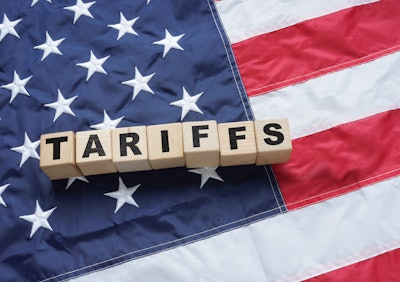
Coupa’s research revealed that 88% of consumers believe that an increase in costs will be passed down to them as new tariffs are implemented. In addition, almost one-third (29%) of suppliers globally believe tariffs are the greatest external threat to profits in 2025.
“Amidst the uncertainty of new and increasing tariffs, businesses that fail to swiftly adapt risk losing their competitive edge and will experience impact to their bottom line. Now is the time for businesses to embrace AI and leverage technology and scenario modeling to fortify supply chain resiliency and safeguard profitability,” says Nari Viswanathan, senior director, supply chain strategy at Coupa. “Coupa AI empowers businesses to anticipate cost increases, gain deeper visibility into spend, and make the right business trade-offs, including optimizing operations and improving inventory management."
Key takeaways:
· Almost half (42%) of U.S.-based suppliers believe that tariffs will be the greatest threat to their business for the upcoming holidays and a majority (69%) anticipate a decline in revenue this year because of tariffs. Globally, suppliers also cite threats from competitors undercutting prices (24%) or raw materials shortages (14%) as the greatest threats to their businesses.
· For the upcoming holiday season, toys and games (60%) and consumer electronics (50%) were top industries that identified tariffs as the largest threat to their business. The looming concern rings true on the buyer side as well, with more than half (55%) expecting recent trade policies to cause a negative impact on their bottom line in 2025.
· As suppliers strategize to best protect their margins and certain industries scramble to lessen the impact on the peak of the holiday season, nearly half (49%) report plans to increase prices, and 46% are already increasing inventory and stockpiling. Looking again at popular holiday categories, 70% of toys and games suppliers say they will increase prices, while 30% of electronics suppliers plan to increase onshoring.
· None of the suppliers surveyed plan to increase prices by more than 20%. However, the majority (56%) are planning for a 5-10% price increase, meaning average household budgets would need to adjust by at least $300 a month–on the low end–which in combination with a decrease in non-essential consumer spending will likely result in less gifts this holiday season.
· 75% of buyers have increased or plan to increase nearshoring and 61% have increased or plan to increase onshoring. While 56% have increased or plan to increase offshoring, businesses are moving away from sourcing from China (36%), followed closely by the United States (29%), and Germany (23%) in response to predicted tariffs. Suppliers with proven quality and reliability (60%), stable and competitive pricing (57%), and full compliance with regulations (42%) topped the list for buyer preferences.
· In the United States, the majority (84%) of consumers cite cost over quality and variety as the most important factor when shopping. With concerns also growing over the rising cost of living (36%) and trade policies threatening to increase the cost of goods (24%), more than half of consumers (54%) say they have looked for deals or discounts on necessities, 53% have decreased spending on non-essential items, and 67% have adjusted where they spend for better cost options. Those consumers who are cutting back on non-essential spending have cut costs by dining out less (68%) or by swapping brand-name items for generics (52%). As consumers become more aware of how they can lessen the impact of tariffs on their wallets, businesses should note that non-essential spending is becoming less of a priority for consumers.
“Diversification becomes a crucial strategy for businesses as global uncertainty around trade mounts. While taking clear steps to prepare for potential tariff impacts is important, there is also a huge opportunity to drive long-term success by enhancing supplier resiliency and collaboration,” says Prashanth Ravishankar, SVP Coupa Advantage and Supplier Strategy. “Leveraging a vast, dynamic buyer-supplier network, such as Coupa’s, enables companies to quickly pivot to different scenarios, whether it’s sourcing new suppliers, negotiating contract terms, or optimizing their network.”


















